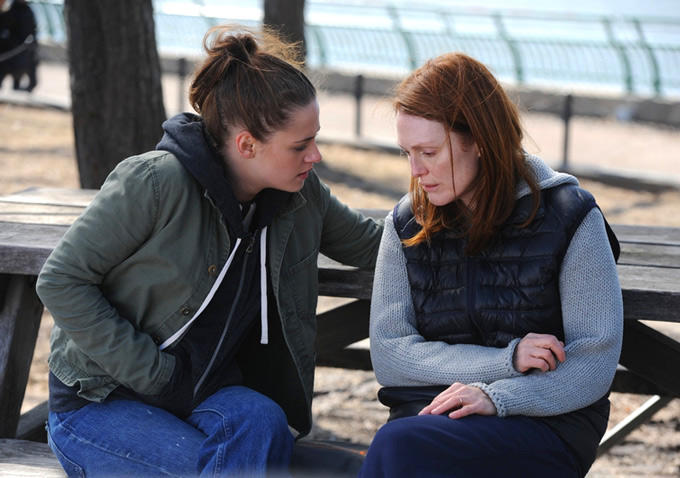

The heroine of “Still Alice,” in the months after she begins to lose her memory, quotes this Elizabeth Bishop poem “One Art” to an audience of family, friends, and strangers. She gives the speech haltingly but with a sort of quiet confidence, highlighting each line she has read so that she does not repeat herself. Julianne Moore as the slowly-deteriorating Alice Howland delivers a quietly sympathetic performance — it’s no surprise that she won an Academy Award for it.
“Still Alice,” directed by Richard Glatzer and Wash Westmoreland and adapted from Lisa Genova’s 2007 novel, is about “the art of losing,” as Elizabeth Bishop puts it. The film focuses on the fictional Alice Howland, a world-renowned linguistics professor at Columbia who is diagnosed with early-onset Alzheimer’s. At the beginning, she forgets small things — the phrase “word stock,” an appointment or two — but as the months go on, her memory blurs and fades until she doesn’t recognize her youngest daughter. Julianne Moore plays this transformation subtly, manifesting every emotion from slight annoyance to deep anger in a restrained click of the tongue or a clenched fist.
There is one jolting point in the film at which she seems to deteriorate instantaneously. Beyond this single unnatural moment, we almost don’t notice her decline. Moore as Alice is not a one-dimensional victim of a disease. She is an incredibly successful woman who wants to shoulder the burden by herself and stubbornly refuses to let go of her ideal past self. She is flawed. She uses her illness as an excuse to force her children to do what she wants and to avoid social commitments. In the latter example, she misses an important dinner with her husband’s coworker. “I was at Pinkberry,” she says, shrugging. “I have Alzheimer’s.” It’s sad and simple and so funny.
The different ways in which Alice’s family members react to her disease are telling. Her eldest daughter, Anna (Kate Bosworth) is usually prim and composed, but flustered in the face of her mother’s Alzheimer’s. She — and the rest of the family — chooses to treat Alice as a patient. Alec Baldwin plays a frustratingly uncomprehending husband. He loves Alice, but ultimately ceases to recognize her without her veil of perfection. Only Alice’s youngest daughter, Lydia (in an honest, organic performance by Kristen Stewart) carries on as usual, fighting her mother about her future prospects and demanding that she respect her privacy. She is the only one to ask Alice how she feels. To Lydia, her mother is still Alice. This is not a story about a hero who prevails over a disease despite all odds. It is a story about an ordinary person with a crippling illness. She makes mistakes. Her own disgust at her debilitation almost kills her. But she is a hero nonetheless — as ordinary people are.
The film itself plays a little like a made-for-TV drama, more focused on the story than on the more artistic aspects of cinema. I couldn’t help but think of “Memento,” Christopher Nolan’s 2000 thriller masterpiece, in which the unconventional chronological structure — one storyline moving forward, one moving backwards in 15-minute increments — allows the viewer to experience the confusion and amnesia of the film’s leading character. “Still Alice” is roughly told through Alice’s point of view, but the cinematography itself doesn’t lend itself in any patterned way to her perspective. A few shots do mimic her disorientation. My favorites were the three extreme close-ups of blurred Pinkberry yogurt toppings, which seem first like medicine pills, then like bacteria — we too are disoriented, until Baldwin’s voice brings us back to the very concrete present of the frozen yogurt shop. On the whole, however, Glatzer and Westmoreland miss many an opportunity to ground the viewers themselves in the confusing reality of the disease. Genova’s novel was written entirely in Alice’s perspective, and as her disease takes over, the reliability of her account falters. Without the camera depicting this inner turbulence in the film, however, it is difficult for us to comprehend the tangible emotions of losing. We watch Alice losing, but we ourselves lose little.
Still, despite its artistic misses, the strength of this movie lies in its acting and in the story it attempts to tell. The fact that director Richard Glatzer is fighting ALS makes “Still Alice” more powerful. His struggle echoes Alice’s desire to be involved, to live in the now, and to keep going despite the possibility of failure at any moment. The message at times is almost too precious, but the actors’ measured performances reel the film back. Alice follows the Bishop poem by saying: “One thing I will try to hold on to is the memory of speaking here today. It will go, I know it will. It may be gone by tomorrow. But it means so much to be talking here, today.” She knows that she will lose more, and she does. In that ephemeral moment, however, the only thing that matters is her family in front of her, her brief lucidity, and the fact that she remembers everything.